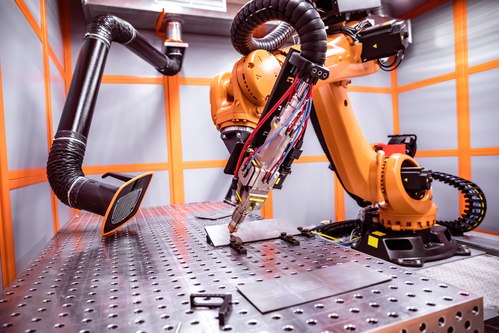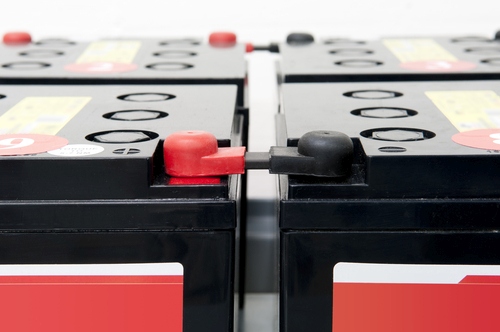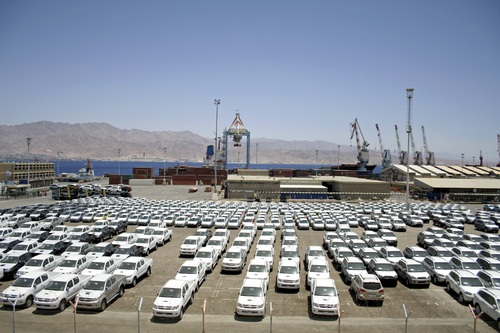KT acquires stake from Hyundai’s robotics division
KT Corp, a leading telecommunications company in South Korea, announced in mid-June that it would acquire a 10 percent stake in the robotics business unit of the shipbuilder Hyundai Heavy Industries Group. KT hopes that the investment will improve its competitiveness in the field of modern manufacturing and robotics for industry. In detail, KT is purchasing company shares from Hyundai Robotics Co., the largest manufacturer of industrial robots in Korea, with a value of the equivalent of 41.4 million US dollars.

Hyundai Robotics is a wholly owned subsidiary of Hyundai Heavy Industries Holding Co. which in turn is the holding company of South Korea’s largest shipbuilder. At the same time, KT signed a cooperation agreement with Hyundai Heavy Industries for various innovations in their industries. KT is contributing its experience in software development, 5G networking, artificial intelligence (AI), and Big Data to this partnership, while Hyundai Robotics will develop robots for these applications. Together, the two companies plan to build so-called service robots to complement existing industrial robots.
In the area of advanced manufacturing, KT will provide its telecommunications and security services, while Hyundai Robotics will provide the automation and robotics technology to upgrade production to a smart or intelligent factory.
We would be pleased to support you with your Korea certification and are also available to answer your questions at any time. Send us an email or call us at +49-69-2713769259.
Hyosung builds world’s largest liquid hydrogen plant in Korea
The Hyosung Group, under the leadership of its Chairman Cho Hyun-joon, wanted to support the local industry and economy in the application and processing of hydrogen with its plan to build the world’s largest liquid hydrogen plant. To this end, the Group has signed a MoU with the Linde Group and plans to invest the equivalent of 220 million euros in the construction of a complete value chain for the production, transport and distribution of liquid hydrogen by 2023. The memorandum of understanding was signed last Tuesday between Hyosung’s Cho and Linde Korea Executive Board member Sung at the company’s headquarters in Seoul.
The two companies agreed to build a 30,000 square metre facility in Ulsan for the production of 13,000 tonnes of liquid hydrogen per year. This amount can be used to power approximately 100,000 hydrogen vehicles and is currently the world’s largest stand-alone liquid hydrogen production facility according to the company. Construction work is scheduled to begin in the first quarter of 2021 and to be completed during 2022. The liquid hydrogen produced in the plant can be used to power a wide variety of vehicles. By building the plant, the Group hopes to attract and develop related hydrogen industries.

In order to deepen the partnership between Hyosung and Linde, it has been agreed that 120 hydrogen fuel pumps will be installed nationwide to ensure a reliable supply for hydrogen-powered vehicles. Hyosung Heavy Industries has operated a network of natural gas (CNG) filling stations since 2000 and entered the hydrogen market in 2008. Currently, Hyosung is the market leader in hydrogen filling stations with a 40 percent market share and 15 filling stations nationwide.
Hyosung CEO Cho said hydrogen is an environmentally friendly energy carrier that can restructure the oil-based economy while creating new innovations. “Therefore, Hyosung will focus on the liquid hydrogen business and increase efficiency and safety in storage and transportation,” Cho added. Cho believes that his company’s investment will play a significant role in revitalizing the local hydrogen industry. In January last year, the South Korean government announced that it would support the hydrogen industry through tax breaks and subsidies. The goal is the production of 6.2 million hydrogen vehicles and the installation of 1,200 gas pumps by 2040.
We would be pleased to support you with your Korea certification and are also available to answer your questions at any time. Send us an email or call us at +49-69-2713769259.
LG Chem and SK Innovation expand their market shares in automotive batteries
Market observers from SNE Research included the two South Korean companies in a list of the ten largest vehicle battery manufacturers in the world. While SK Innovation’s total production, measured in megawatt hours, declined slightly by 2 percent from 193 MWh to 189 MWh, LG Chem increased by 6.9 percent from 924 MWh to 988 MWh.
The growth at LG Chem, South Korea’s number one in the production of automotive batteries, resulted from the good sales figures of the Tesla Model 3. LG Chem was one of only two companies that were able to show positive growth in April 2020 compared to the previous year. Sales of competitor Samsung SDI fell by 41 percent in the same period. Samsung SDI has many customers in Europe, including BMW. Their production facilities suffered greatly from the lockdown due to the corona virus and had to close down temporarily or stop production.

In a global comparison of market shares for April 2020, Chinese CATL was in first place with around 35 percent, followed by LG Chem with 18 percent and fifth place SK Innovation with 3.5 percent. Calculated for the entire period from January to April 2020, LG has the largest market share with 25.5 percent, SK Innovation is in seventh place with 4.2 percent.
We would be pleased to support you with your Korea certification and are also available to answer your questions at any time. Send us an email or call us at +49-69-2713769259.
Rising sales figures in Korea for imported vehicles
The number of newly registered vehicles in April 2020 was 29,450, an increase of 25.9 percent over the previous year. The 20,000 mark was already exceeded in March. The corresponding figures were published on 7 May by the Korean Association for Vehicle Import and Distribution. In April 2019 Audi and Volkswagen were unable to sell vehicles due to a legitimation problem, but were able to increase their sales figures in April of this year.
BMW also had problems selling its new cars in April 2019, some of which caught fire, but the figures normalized this year. BMW is currently in second place in terms of sales figures, with 5,123 vehicles sold in April 2020, an increase of 58.8 per cent over last year. Audi is in third place with 2,043 vehicles and Volkswagen is fourth with 1,345 vehicles. The front-runner among imported new vehicles is Mercedes-Benz with 6,745 vehicles sold in April, an increase of 3.1 percent compared to the previous year.

In contrast, the figures for Japanese imported vehicles fell in April. A total of 1,259 units were sold, a decrease of 64.4 percent compared to the same period in 2019. Sales of Lexus (461 vehicles) and Toyota (309 vehicles) fell by 68 and 63 percent respectively. Sales of Honda, Nissan and Infiniti were also down. Only Lexus increased its sales by 12 percent compared to March.
Looking at the figures for the individual imported vehicle models, Volkswagen’s Tiguan 2.0 TDI is the best-selling import vehicle in April with 1,180 units. The Mercedes CLA 250 4MATIC (706 vehicles), the BMW 520 (687 vehicles) and the Mercedes E 300 4MATIC (673 vehicles) take the other places.
We would be pleased to support you with your Korea certification and are also available to answer your questions at any time. Send us an email or call us at +49-69-2713769259.



